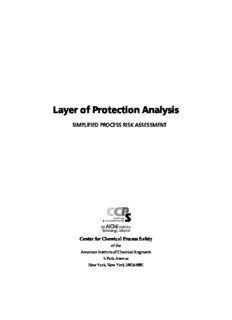Table Of ContentLayer of Protection Analysis
SIMPLIFIED PROCESS RISK ASSESSMENT
CenterforChemicalProcessSafety
ofthe
AmericanInstituteofChemicalEngineers
3ParkAvenue
NewYork,NewYork10016-5991
Copyright©2001
AmericanInstituteofChemicalEngineers
3ParkAvenue
NewYork,NewYork10016-5991
Allrightsreserved. Nopartofthispublicationmaybereproduced,
storedinaretrievalsystem,ortransmittedinanyformorbyany
means,electronic,mechanical,photocopying,recording,orotherwise
withoutthepriorpermissionofthecopyrightowner.
LibraryofCongressCataloging-in-PublicationData
CIPDataappliedfor.
ISBN0-8169-0811-7
Itissincerelyhopedthattheinformationpresentedinthisvolumewillleadtoanevenmoreimpressivesafety
recordfortheentireindustry.However,theAmericanInstituteofChemicalEngineers,itsconsultants,CCPS
Subcommitteemembers,theiremployers,andtheiremployers’officersanddirectorsdisclaimmakingor
givinganywarrantiesorrepresentations,expressorimplied,includingwithrespecttofitness,intendedpur-
pose,useormerchantability,and/orcorrectnessoraccuracyofthecontentoftheinformationpresentedinthis
document.Asbetween(1)AmericanInstituteofChemicalEngineers,itsconsultants,CCPSSubcommittee
members,theiremployers,andtheiremployers’officersanddirectorsand(2)theuserofthisdocument,the
useracceptsanylegalliabilityorresponsibilitywhatsoeverfortheconsequencesofitsuseormisuse.
Acknowledgments
TheAmericanInstituteofChemicalEngineersandtheCenterforChemical
ProcessSafetyexpresstheirgratitudetoallthemembersoftheLayerofPro-
tectionAnalysisSubcommitteefortheirgenerouseffortsandtechnicalcontri-
butionsinthepreparationofthisConceptSeriesbook.
LayerofProtectionAnalysis:SimplifiedProcessRiskAssessmentwaswritten
bytheCenterforChemicalProcessSafetyLayerofProtectionAnalysisSub-
committee.
Chair:
ArthurM.Dowell,III,P.E. RohmandHaasCompany
Theprimaryauthorswere
WilliamG.Bridges ABSConsulting(includesformerJBFAssociates)
ArthurM.Dowell,III,P.E. RohmandHaasCompany
MartinGollin Consultant,formerlyofARCOChemical
WarrenA.Greenfield InternationalSpecialtyProducts
JohnM.Poulson nowretiredfromUnionCarbideCorporation
WilliamTuretsky InternationalSpecialtyProducts
Providingsupportandvaluablecontributionsthroughouttheprojectwere
JohnT.Marshall TheDowChemicalCompany
StanleyA.Urbanik E.I.DuPontdeNemoursandCompany
Providingimportantguidanceintheconceptualphasesofthebookwere
RodgerM.Ewbank RhodiaInc.
RobertJ.Gardner nowretiredfromE.I.DuPontdeNemoursandCompany
KumarBhimavarapu FactoryMutualResearch
JohnA.McIntosh TheProctor&GambleCompany
xiii
xiv Acknowledgments
R.PeterStickles A.D.Little
ArthurW.Woltman EquilonEnterprisesLLC,formerlyShell
CCPSStaffConsultant
RobertE.Bollinger CenterforChemicalProcessSafety
Editor
Dr.DanielA.Crowl MichiganTechnologicalUniversity
TheSubcommitteeacknowledgesthesupportandcontributionsoftheir
employer organizations in completing this book. Dr. Jack Weaver and Mr.
LesWittenbergofCCPSsponsoredandsupportedthisprojectandprovided
accesstotheresourcesofCCPSanditssponsoringorganizations.Theauthors
thankthefollowingfortheircontributionsincreationoffiguresandtables,
settingupcommitteemeetingsandteleconferencesandotheradministrative
functionsthatwereessentialtothecompletionofthisbook:Ms.JillJohnson
and Mr. Paul M. Olsen, ABS Consulting; Ms. Sandy Baswell, Ms. Marge
Killmeier, Ms. Angella Lewis and Ms. Jackie Rico’t, Rohm and Haas Com-
pany.
Before publication, all CCPS books are subjected to a thorough peer
review process. CCPS also gratefully acknowledges the thoughtful com-
mentsandsuggestionsofthepeerreviewers.Theirworkenhancedtheaccu-
racyandclarityofthebook.
SteveArendt ABSConsulting(includesformerJBFAssociates)
HelmutBezecny DowDeutschlandInc.
AlfredW.Bickum GoodyearTireandRubberCompany
DennisBlowers,C.S.P. SolvayPolymers,Inc.
MichaelP.Broadribb BPAmocoCompany
DavidCampbell ConcordAssociates
BillCarter CCPSStaffConsultant
CurtisClements E.I.DuPontdeNemoursandCompany
KimberlyF.Dejmek WilfredBakerEngineering
RichardR.Dunn E.I.DuPontdeNemoursandCompany
JimEvans UnionCarbideCorporation
RodgerM.Ewbank RhodiaInc.
DaveFontaine ChevronCorporation
RaymondA.Freeman ABSConsulting
RaymondW.French ExxonMobilCorporation
DallasL.Green RohmandHaasCompany
DennisC.Hendershot RohmandHaasCompany
WilliamH.Johnson E.I.DuPontdeNemoursandCompany
PeterN.Lodal,P.E. EastmanChemicalCompany
DonaldM.Lorenzo ABSConsulting(includesformerJBFAssociates)
Acknowledgments xv
VicMaggioli FeltronicsCorporation
RickMann UnionCarbideCorporation
PeterMcGrath OlinCorporation
NormanMcLeod ATOFINAChemicals,Inc.
SteveMetzler PrimatechInc.
Dr.HansPasman TNO
JackPhilley,C.S.P. DetNorskeVeritas(DNV)
MichaelE.G.Schmidt,P.E. IndustrialRiskInsurers
ArtSchwartz BayerCorporation
AdrianSepeda OccidentalChemicalCorporation
BastiaanSchupp DelftUniversityofTechnology
RobertStankovich EliLillyandCompany
PeterStickles A.D.Little
Dr.AngelaE.Summers,P.E. SIS-TechSolutions,LLC
ClarkThurston UnionCarbideCorporation
AnthonyTorres EastmanKodak
JanWindhorst NOVAChemicals
Acronyms and Abbreviations
AIChE AmericanInstituteofChemicalEngineers
ALARP AsLowasReasonablyPracticable
ANSI AmericanNationalStandardsInstitute
API AmericanPetroleumInstitute
ASME AmericanSocietyofMechanicalEngineers
BI BusinessInterruption
BLEVE BoilingLiquidExpandingVaporExplosion
B.P. BoilingPoint
BPCS BasicProcessControlSystem
C Consequencefactor,relatedtomagnitudeofseverity
CCF CommonCauseFailure
CCPS CenterforChemicalProcessSafety,
AmericanInstituteofChemicalEngineers
CEI DowChemicalExposureIndex
CPQRA ChemicalProcessQuantitativeRiskAssessment
CW CoolingWater
D Numberoftimesacomponentorsystemischallenged
(hr–1oryear–1)
DCS DistributedControlSystem
DIERS DesignInstituteforEmergencyReliefSystems,
AmericanInstituteofChemicalEngineers
DOT DepartmentofTransportation
xvi
AcronymsandAbbreviations xvii
EBV EmergencyBlockValve
ERPG EmergencyResponsePlanningGuideline
EuReData EuropeanReliabilityData(seriesofconferences)
F FailureRate(hr-1oryear-1)
f Frequency(hr-1oryear-1)
F&EI DowFireandExplosionIndex
F/N FatalityFrequencyversusCumulativeNumber
FCE FinalControlElement
FMEA FailureModesandEffectAnalysis
FTA FaultTreeAnalysis
HAZOP HazardandOperabilityStudy
HE HazardEvaluation
HRA HumanReliabilityAnalysis
IEC InternationalElectrotechnicalCommission
IEEE InstituteofElectricalandElectronicEngineers
IPL IndependentProtectionLayer
ISA TheInstrumentation,Systems,andAutomationSociety
(formerly,InstrumentSocietyofAmerica)
LAH LevelAlarm—High
LI LevelIndicator
LIC LevelIndicator—Control
LFL LowerFlammabilityLimit
LNG LiquefiedNaturalGas
LOPA LayerofProtectionAnalysis
LOTO Lock-OutTag-Out
LT LevelTransmitter
MAWP MaximumAllowableWorkingPressure
MOC ManagementofChange
N2 Nitrogen
OSBL OutsideBatteryLimits
OREDA TheOffshoreReliabilityDataproject
OSHA OccupationalSafetyandHealthAdministration(U.S.)
Pfatality ProbabilityofFatality
Pignition ProbabilityofIgnition
Ppersonpresent ProbabilityofPersonPresent
P Probability
P&ID PipingandInstrumentationDiagram
xviii AcronymsandAbbreviations
PFD ProbabilityofFailureonDemand
PHA ProcessHazardAnalysis
PI PressureIndicator
PL ProtectionLayer
PM PreventiveMaintenance
PSM ProcessSafetyManagement
PSV PressureSafetyValve(ReliefValve)
R Risk
RV ReliefValve
SCE SafetyCriticalEquipment
SIF SafetyInstrumentedFunction
SIL SafetyIntegrityLevel
SIS SafetyInstrumentedSystem
T TestIntervalfortheComponentorSystem(hoursoryears)
VCE VaporCloudExplosion
VLE VaporLiquidEquilibrium
XV RemoteActivated/ControlledValve
Preface
Forover40yearstheAmericanInstituteofChemicalEngineers(AIChE)has
been involved with process safety and loss control in the chemical, petro-
chemical, hydrocarbon process and related industries and facilities. The
AIChE publications are information resources for the chemical engineering
andotherprofessionsonthecausesofprocessincidentsandthemeansofpre-
ventingtheiroccurrencesandmitigatingtheirconsequences.
The Center for Chemical Process Safety (CCPS), a Directorate of the
AIChE,wasestablishedin1985todevelopanddisseminateinformationfor
useinpromotingthesafeoperationofchemicalprocessesandfacilitiesand
thepreventionofchemicalprocessincidents.Withthesupportanddirection
of its advisory and management boards, CCPS established a multifaceted
programtoaddresstheneedforprocesssafetytechnologyandmanagement
systemstoreducepotentialexposurestothepublic,theenvironment,person-
nelandfacilities.Thisprogramentailsthedevelopment,publicationanddis-
semination of Guidelines relating to specific areas of process safety;
organizing, convening and conducting seminars, symposia, training pro-
grams,andmeetingsonprocesssafety-relatedmatters;andcooperatingwith
otherorganizationsandinstitutions,internationallyanddomesticallytopro-
moteprocesssafety.WithinthepastseveralyearsCCPSextendeditspublica-
tionprogramtoincludea“ConceptSeries”ofbooks.Thesebooksarefocused
onmorespecifictopicsthanthelonger,morecomprehensiveGuidelinesseries
andareintendedtocomplementthem.Withtheissuanceofthisbook,CCPS
haspublished65books.
CCPSactivitiesaresupportedbythefundingandtechnicalexpertiseof
over 80 corporations. Several government agencies and nonprofit and aca-
demicinstitutionsparticipateinCCPSendeavors.
xi
xii Preface
In1989CCPSpublishedthelandmarkGuidelinesfortheTechnicalManage-
mentofChemicalProcessSafety.Thisbookpresentsamodelforprocesssafety
management built on twelve distinct, essential, and interrelated elements.
Theforewordtothatbookstates:
Forthefirsttimealltheessentialelementsandcomponentsofamodelofa
technicalmanagementprogramhavebeenassembledinonedocument.We
believe the Guidelines provide the umbrella under which all other CCPS
TechnicalGuidelineswillbepromulgated.
ThisConceptSeriesbooksupportsseveralofthetwelveelementsofpro-
cesssafetyenunciatedinthelandmarkGuidelinesfortheTechnicalManagement
ofChemicalProcessSafetyincludingProcessRiskManagement,IncidentInves-
tigation,ProcessKnowledgeandDocumentation,andEnhancementofPro-
cess Safety Knowledge. The purpose of this book is to assist designers and
operatorsofchemicalfacilitiestouseLayerofProtectionAnalysis(LOPA)to
evaluateriskandtomakerationaldecisionstomanageriskwithasimplified
methodology.
Description:Layer of protection analysis (LOPA) is a recently developed, simplified method of risk assessment that provides the much-needed middle ground between a qualitative process hazard analysis and a traditional, expensive quantitative risk analysis. Beginning with an identified accident scenario, LOPA us

